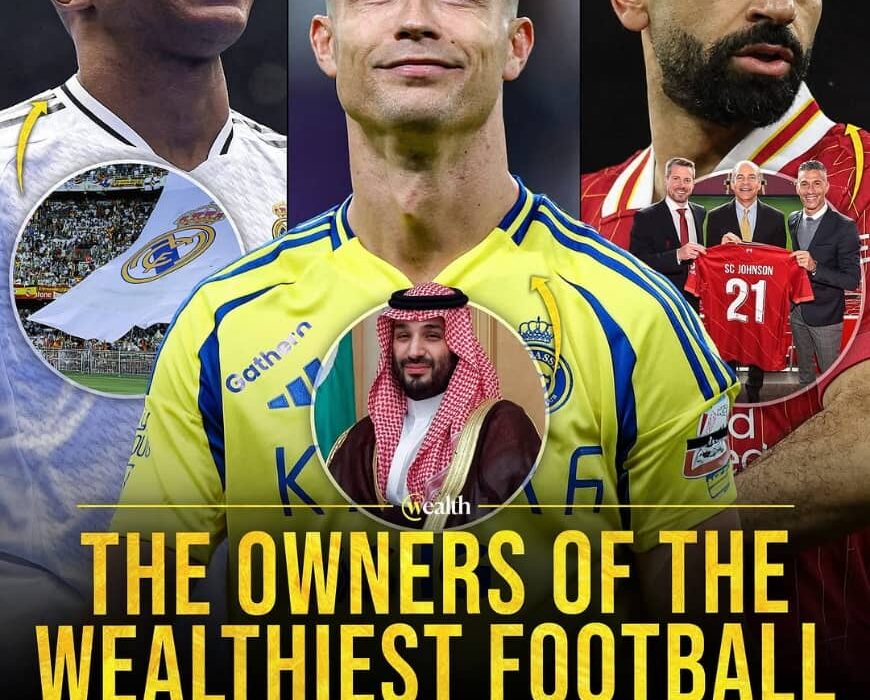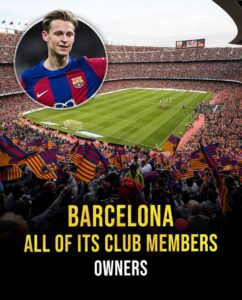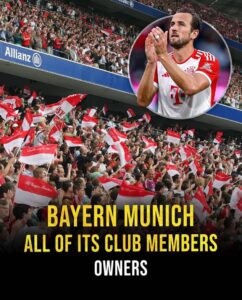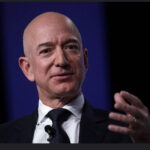Unveiling Billionaire Chests Behind the World’s Wealthiest Football Clubs

In the modern era of football, the beautiful game has increasingly become a playground for billionaires, sovereign wealth funds, and corporate giants. As transfer fees soar and global TV rights generate billions, the financial muscle behind clubs plays a pivotal role in shaping success on and off the pitch. Here’s a closer look at the wealthiest football club owners in the world today.
1. Saudi Arabia’s Public Investment Fund – Newcastle United
Topping the list is Saudi Arabia’s Public Investment Fund (PIF), boasting a staggering net worth of $925 billion. In 2021, PIF took control of Newcastle United, initiating a dramatic transformation of the club’s fortunes. Beyond Newcastle, PIF has spread its influence across football by acquiring several major Saudi Pro League clubs, including Al Hilal, Al Nassr, Al Ittihad, and Al Ahli, fueling an ambitious project to elevate the kingdom’s global sporting presence.
2. Mark Mateschitz – Red Bull Football Group
With a personal fortune of $37.9 billion, Mark Mateschitz inherited the Red Bull empire after the passing of his father, Dietrich Mateschitz. The energy drink giant owns a network of clubs across continents, including RB Leipzig (Germany), Red Bull Salzburg (Austria), and New York Red Bulls (USA). Red Bull’s football model emphasizes youth development and modern football science, yielding competitive results and a distinctive brand identity.
3. Sheikh Mansour – City Football Group
The man behind Manchester City’s rise to global dominance, Sheikh Mansour, oversees the City Football Group, a global football conglomerate with a net worth of approximately $22 billion. Since acquiring Manchester City in 2008, the group has expanded to include clubs in the USA, Australia, Spain, Japan, and beyond. Under Mansour’s stewardship, City have won multiple Premier League titles and a UEFA Champions League crown.
4. Andrea Agnelli & The Agnelli Family – Juventus
Italian industrial royalty, the Agnelli family, commands $19.1 billion in wealth through their stake in Fiat and Ferrari. Andrea Agnelli served as Juventus chairman until 2023, overseeing a dominant domestic era in Serie A. Though the club has faced turbulence in recent years, the Agnellis remain deeply intertwined with its history and operations.
5. Stan Kroenke – Arsenal FC
American tycoon Stan Kroenke, with an estimated net worth of $16 billion, has steadily increased his control over Arsenal FC since first investing in the club in 2007. Through his company, Kroenke Sports & Entertainment, he also owns franchises in the NFL, NBA, and NHL, making him a dominant force in the global sports business landscape.
Other Notable Owners Shaping the Football World
• Todd Boehly – Chelsea FC
The American billionaire co-led a consortium to acquire Chelsea in 2022, marking a new chapter following Roman Abramovich’s exit. His $8.5 billion fortune is funneled through Eldridge Industries.
• Nasser Al-Khelaifi – Paris Saint-Germain
The chairman of Qatar Sports Investments, Al-Khelaifi has turned PSG into a global brand, attracting superstars like Messi, Neymar, and Mbappé. His estimated wealth stands at $8 billion.
• Zhang Jindong – Inter Milan
The Chinese retail magnate acquired Inter Milan in 2016 via Suning Holdings. With a net worth of $7.4 billion, Zhang aimed to bring the club back to the summit of European football, achieving success with a Serie A title in 2021.
• Philip Anschutz – LA Galaxy
A pioneer in American soccer, Anschutz helped found Major League Soccer and remains a key figure through his $15 billion empire, particularly with LA Galaxy, one of the league’s most decorated clubs.
What’s Next?
• Elon Musk Eyes Liverpool FC
In a surprising twist, tech magnate Elon Musk has reportedly shown interest in acquiring Liverpool FC. Should such a deal materialize, the club could receive a massive financial boost, joining the elite echelon of ultra-rich ownership.
• The Arnault Family Enters Football
The Arnault family, headed by LVMH boss Bernard Arnault, plans to purchase Paris FC. With a vision to rival PSG, this move signals serious intent to shake up the French football hierarchy.
As football becomes more globalized and commercially lucrative, club ownership continues to shift toward high-net-worth individuals and investment groups. The impact of these ownership models is profound—not only in terms of transfer budgets but also in global fan engagement, infrastructure development, and branding.
Football, it seems, is no longer just a game. It’s big business.
















